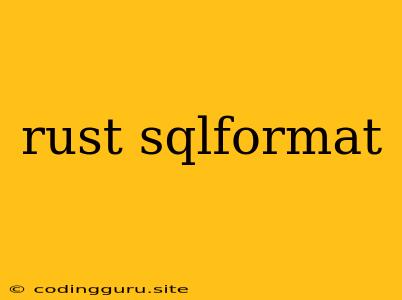Working with SQL in Rust: A Guide to SQL Formatting
Rust, the modern, fast, and memory-safe programming language, offers various ways to interact with databases. When working with SQL in Rust, you might find yourself needing to format SQL queries for clarity, readability, and debugging. This guide will explore the realm of SQL formatting within the Rust ecosystem.
Why is SQL Formatting Important?
Let's face it, even simple SQL queries can become complex. Imagine a query with multiple joins, conditions, and subqueries. Without proper formatting, it can quickly become a tangled mess, difficult to understand and maintain. Here's why formatting is crucial:
- Readability: Well-formatted SQL queries are easier to read and comprehend, especially for complex queries.
- Maintainability: Clear and organized code, including SQL, reduces errors and makes it easier for developers to understand and modify queries in the future.
- Debugging: Debugging complex SQL is easier when the code is neatly formatted, allowing for easier identification of syntax errors or logical flaws.
Rust Libraries for SQL Formatting
Rust provides a variety of crates to tackle SQL formatting. Let's explore some popular options:
1. sqlformat
The sqlformat crate is specifically designed for formatting SQL queries. It offers various configuration options for customizing the output. Here's a simple example:
use sqlformat::{format, Options};
fn main() {
let sql = "SELECT * FROM users WHERE id = 1 AND name = 'John Doe'";
let formatted_sql = format(sql, &Options::default());
println!("{}", formatted_sql);
}
This code will output:
SELECT *
FROM users
WHERE id = 1 AND name = 'John Doe';
2. pretty_assertions
While not exclusively for SQL, the pretty_assertions crate is handy for displaying formatted strings. It provides a assert_eq! macro that compares formatted strings, helping you verify the expected output of your SQL queries.
3. Custom Formatting Functions
You can also create your own functions for formatting SQL queries. This gives you complete control over the output and allows for highly tailored formatting.
Tips for Effective SQL Formatting
- Use Indentation: Indent your SQL code to create a visually appealing hierarchy. This helps highlight the structure of the query, especially with complex joins and subqueries.
- Consistent Spacing: Use consistent spacing around keywords, operators, and values.
- Break Long Lines: Avoid long lines in your SQL queries. Split them into multiple lines for readability.
- Use Comments: Add comments to explain the logic behind complex SQL queries. This is especially useful for maintaining and collaborating on projects.
Conclusion
Formatting SQL queries is an essential practice when working with Rust and databases. By using a dedicated library like sqlformat, adopting good formatting conventions, and utilizing custom formatting functions, you can create clear, maintainable, and easily debuggable SQL code. This not only enhances code quality but also significantly improves developer efficiency and collaboration.
